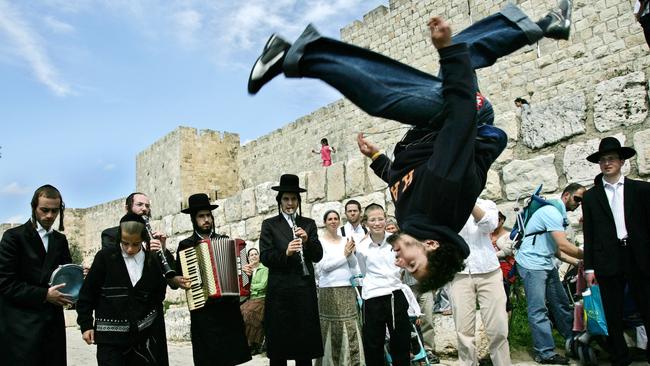Religious orthodoxy is rooted in the fear of women

At Ben Gurion airport in Tel Aviv she paid extra for an aisle seat but was moved by cabin crew because two ultra-Orthodox male passengers objected to sitting next to a woman. She says she was “insulted and humiliated . . . it was the first time in my adult life I was discriminated against for being a woman”. She was told that ultra-Orthodox men often make this demand and two months later it happened again. Her suit is supported by the Israel Religious Action Center (Irac). Israeli law, like ours, prohibits discrimination on grounds of gender, race, religion, orientation and politics, and the Irac won a similar case five years ago against the airline El Al for Renee Rabinowitz, a retired lawyer. As the wife of a rabbi and keeper of a kosher home, when asked to move she told the man that there was nothing in the Torah forbidding him to sit next to women. He cited “a general principle that a person should not put himself in a dangerous situation”. To which Ms Rabinowitz said: “I"m an 81-year-old woman - what’s your problem?”
Note that these protests came not from libertarian unbelievers but from respected Jewish women and the Irac in Jerusalem. Its leader, Anat Hoffman, robustly said: “Ultra-Orthodox extremists get away with demands that have nothing to do with Judaism. Humiliating women can in no way qualify as a religious act.”
We outsiders may applaud, but it is this sort of close-up resistance from insiders that is the best answer to cultural misogynies. It can be more forthright and sure of itself than the wavering, awkward cultural cringe of wider lay society. We see the effect when brave women from south Asian communities in Britain condemn forced marriage and “honour” crimes, female Muslims defy the restriction of the burka, and Somali women condemn the brutality of female genital mutilation (Britain has managed only four FGM prosecutions so far; a tenth of those in France).
We saw it in Anglicanism too, as determined but irreproachably pious women overthrew the ban on female ordination. And on a lighter note, five years before his country lifted the ban on women driving, the Saudi comedian Hisham Fageeh made a hilarious video. In traditional dress and beard he crooned “No woman, no drive!” in the style of Bob Marley. The lyrics ("Hey little sister, don’ touch that wheel!") mixed coaxing patronage and veiled threat, enjoining women to obedience and the back seat. It went viral across the Arab world, and its gentle ridicule played its part in the campaign.
All this illustrates the point that you don’t need to be a scornful unbeliever to fight against outworn misogynies and repressions. Shoving from inside the tent works ten times better. Religious cultures are valued because they connect people with history, ancestry and numinous ideals of virtue and spirituality. But that very endurance means that they inevitably drag along some rubbishy old accretions of past times, spirituality tainted with a grubbier historical tangle of status, inheritance, power, the legitimacy of offspring and, face it, the fact that it has always been useful to men to keep women and girls under control.
Religion has also tended towards a prurient obsession with female purity and a rather insulting mistrust of male self-control. Keeping women apart and silent, locking them up or concealing their dangerous hair or tempting lips is an instinct common to many creeds. Female physicality easily becomes a threat: during the long Anglican debate about women priests it was always rewarding to prime certain senior clerics with sherry and lead them on until they admitted that the problem was the idea of a woman at the altar being on her “time of the month”. Some of the taboos held by the ultra-strict are borderline pathological, as when that chap pleaded to the respectable octogenarian Ms Rabinowitz his fear of “putting himself in a dangerous situation”. Admittedly such shrinking taboos are probably aggravated by the recent crass sexualisation of western society. But they are no excuse for treating every woman as an unexploded sexual bomb.
Broadly speaking, against much fashionable thought I am a defender of faith, because religion at its best sweetens and civilises. But our society has evolved to hold women equal as citizens, workers and undisputed owners of our bodies. No cultural cringe, no postcolonial sensitivity or tactful turning of a blind eye can justify belittlement, forced marriage, FGM or any limitation of rights, however trivial. Just as no father owns his daughter, no airline passenger can demand the removal of a nearby female. Step outside your segregated place of worship, mate, and all bets are off: women are just people.
Of course if a woman willingly signs up or remains inside a strict and restrictive sect, she is free to veil and submit: that’s her choice. But the moment she wishes, at any age, to step out into an equal society she should get every help. Her culture should be sharply forbidden to interfere. It even helps if a small token of that sharpness is telling Easyjet cabin crews how to say “No!”
The Times



Whose taboos count highest? Have you a right to impose your notions of sacredness on the public sphere? We in the West may think ourselves children of the Enlightenment, our democratic post-Christian liberalism prettily laced with cultural sensitivity, but small events confound us. Take the case of Melanie Wolfson, who is suing Easyjet for discrimination.